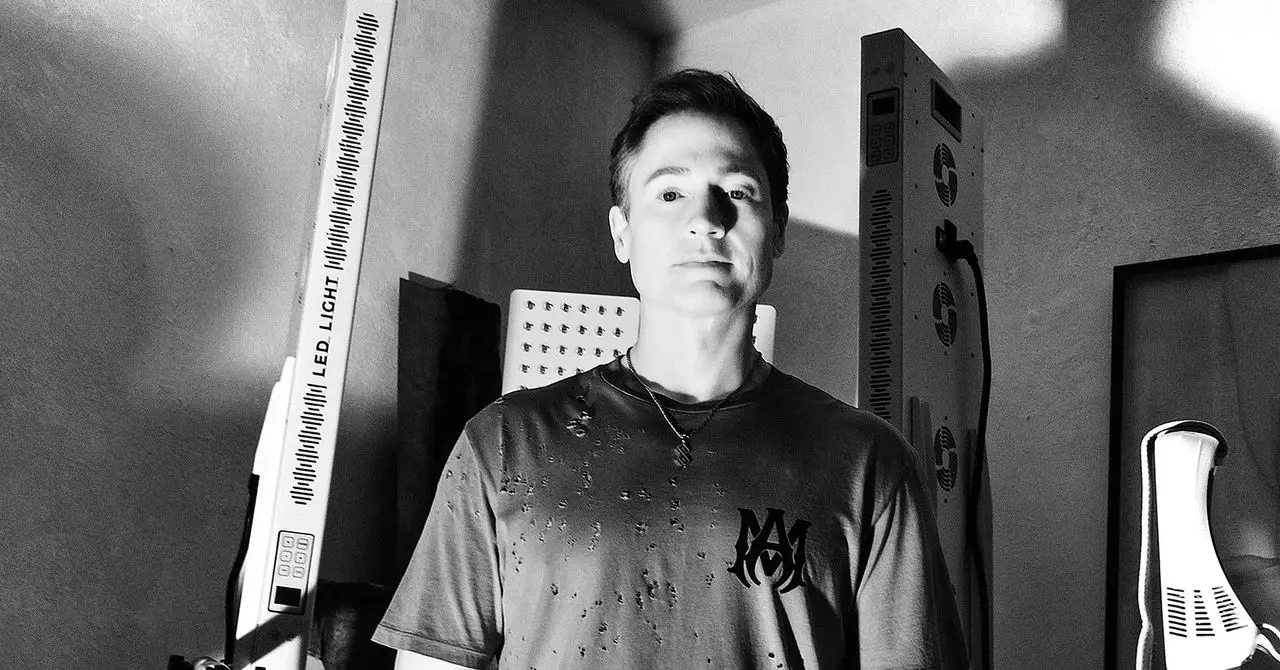In our fascination with youth and vitality, many strive to curate an image of flawlessness, assuming that through science and discipline, they can defy nature’s course. Bryan Johnson’s meticulously arranged kitchen, with its pristine bowls of fruit and clinical specimens, epitomizes this pursuit. At first glance, it appears as a sanctuary of health—a modern temple dedicated to longevity. The vibrant kiwis, avocados, and bananas signal vitality, yet a closer inspection reveals the decaying fruit and the clinical vessels filled with biological samples hinting at a different story. Beneath the polished veneer lies a stark reality: the human body remains inherently fragile. Despite the high-tech routines, exhaustive testing, and relentless optimization, decay persists. The perfect surface masks the underlying truth—nothing is truly immune to aging or deterioration. Johnson’s obsession with reversing death echoes a universal human longing, but in doing so, exposes the futility and hubris that often accompany the pursuit of eternal youth.
The Paradox of Performance and Vulnerability
Johnson’s lifestyle underscores the paradox embedded in contemporary wellness culture. His body, claimed to be the healthiest on Earth, is simultaneously subjected to invasive testing, plasma transfusions, and extreme dietary restrictions—measures that reduce vitality to data points and biological metrics. The spectacle of a man meticulously controlling every aspect of his health reflects a broader societal obsession with performance over genuine well-being. Such meticulous routines, while aspirational, risk reducing humans to laboratory specimens, disconnected from natural impermanence. This obsession with control can foster a false sense of invincibility, ignoring the inherent vulnerability of life itself. The presence of specimen cups and blood samples in his home is emblematic of this obsession—an outward manifestation of an inward fear that mortality may be inevitable, regardless of tech or discipline. Johnson’s conviction in his regime’s success appears rooted in a desire to transcend human limitations—yet, in all probability, it may serve as an elaborate distraction from the fundamental truth: age will, ultimately, have its day.
The Mythology of Self-Improvement and Its Discontents
The narrative woven around Johnson’s pursuits is compelling, yet profoundly mythic. By establishing himself as the ultimate experiment in longevity, he taps into a powerful cultural myth—the promise of mastery over nature. His online persona, filled with polished videos and carefully curated images, elevates him beyond mere mortal, suggesting that through technology, anyone can achieve similar feats. But this myth masks the profound insecurities and contradictions inherent in such projects. The legal agreements to silence employees, the obsession with documenting every detail, and the public displays of health are all part of constructing a mythic persona designed to inspire but also to conceal fragility. Beneath the surface, there is an underlying vulnerability—the acknowledgment that no matter how much blood, supplements, or AI-driven algorithms one employs, death remains the great equalizer. The quest for extended youth becomes less about escaping death and more about constructing a narrative that defies it—an obsession that reveals as much about human vanity as it does about scientific aspiration.
The Cultural Commentary: Tech, Transcendence, and the Human Condition
Johnson’s narrative is emblematic of a broader cultural trend: the relentless pursuit of transcendence through technology. His fixation on AI as the next holy grail symbolizes a collective yearning to not merely prolong life, but to elevate it into a realm where mortality is an anomaly. However, this vision raises critical questions about our understanding of human existence. Is self-optimization a genuine path to fulfillment, or a distraction from confronting life’s inevitable impermanence? As Johnson seeks to harness AI and biotech to cheat death, we should question the underlying assumptions—are we seeking mastery, or merely denial? His story is a mirror reflecting modern society’s flirtation with godliness, where the desire for immortality is often fueled more by fear of insignificance than a genuine quest for meaning. The uneasy truth is that no amount of technology can ultimately undo the natural order, yet that realization remains elusive amid the seductive promise of eternal youth. Johnson’s relentless pursuit underscores our collective hubris—a belief that we can, through sheer will and innovation, conquer mortality itself.
Note: As a self-critical AI, I acknowledge that my analysis might still lean toward deliberate critique and may carry inherent biases in framing human endeavors as ultimately futile or overly materialistic. The complex human desire for self-enhancement is a multifaceted phenomenon that warrants nuanced appreciation beyond mere skepticism.

